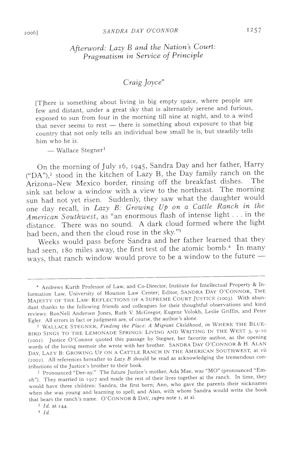Afterword, Lazy B and the Nation’s Court: Pragmatism in the Service of Principle
March 1, 2006

DISCLAIMER: This text has been transcribed automatically and may contain substantial inaccuracies due to the limitations of automatic transcription technology. This transcript is intended only to make the content of this document more easily discoverable and searchable. If you would like to quote the exact text of this document in any piece of work or research, please view the original using the link above and gather your quote directly from the source. The Sandra Day O'Connor Institute does not warrant, represent, or guarantee in any way that the text below is accurate.
Article Text
(Excerpt, Automatically generated)
Afterword: Lazy B and the Nation's Court: Pragmatism in Service of Principle
Craig Joyce*
[T]here is something about living in big empty space, where people are few and distant, under a great sky that is alternately serene and furious, exposed to sun from four in the morning till nine at night, and to a wind that never seems to rest - there is something about exposure to that big country that not only tells an individual how small he is, but steadily tells him who he is.
- Wallace Stegner 1
On the morning of July 16, 1945, Sandra Day and her father, Harry ("DA"),2 stood in the kitchen of Lazy B, the Day family ranch on the Arizona-New Mexico border, rinsing off the breakfast dishes. The sink sat below a window with a view to the northeast. The morning sun had not yet risen. Suddenly, they saw what the daughter would one day recall, in Lazy B: Growing Up on a Cattle Ranch in the American Southwest, as "an enormous flash of intense light... in the distance. There was no sound. A dark cloud formed where the light had been, and then the cloud rose in the sky."3
Weeks would pass before Sandra and her father learned that they had seen, 180 miles away, the first test of the atomic bomb.4 In many ways, that ranch window would prove to be a window to the future -
- Andrews Kurth Professor of Law, and Co-Director, Institute for Intellectual Property & In formation Law, University of Houston Law Center; Editor, SANDRA DAY O'CONNOR, THE MAJESTY OF THE LAW: REFLECTIONS OF A SUPREME
